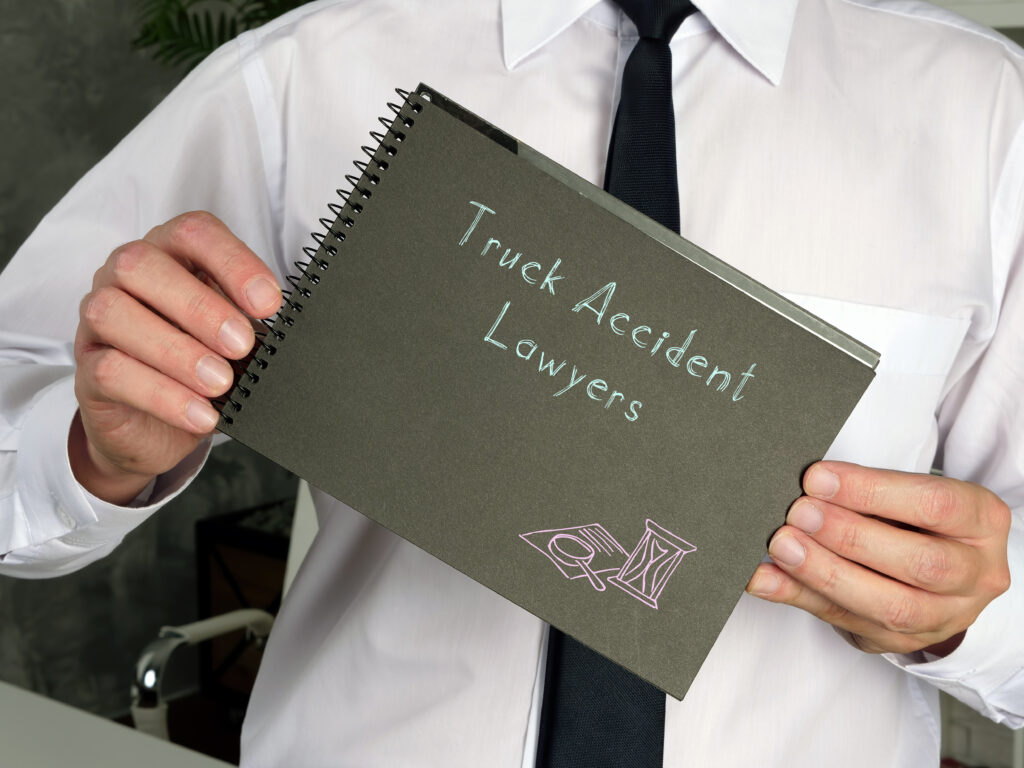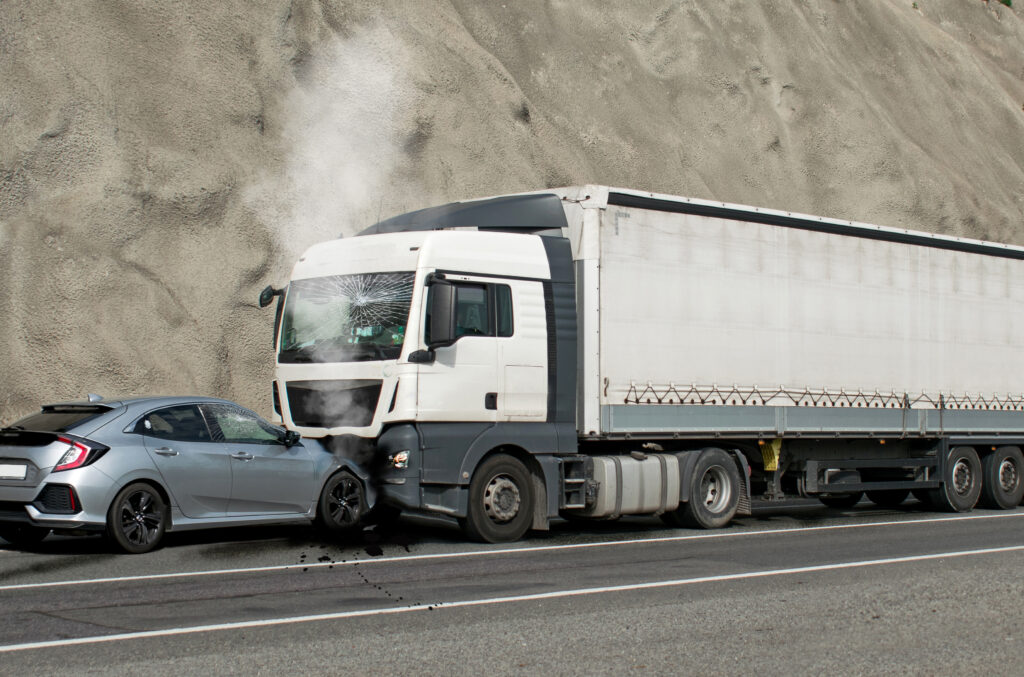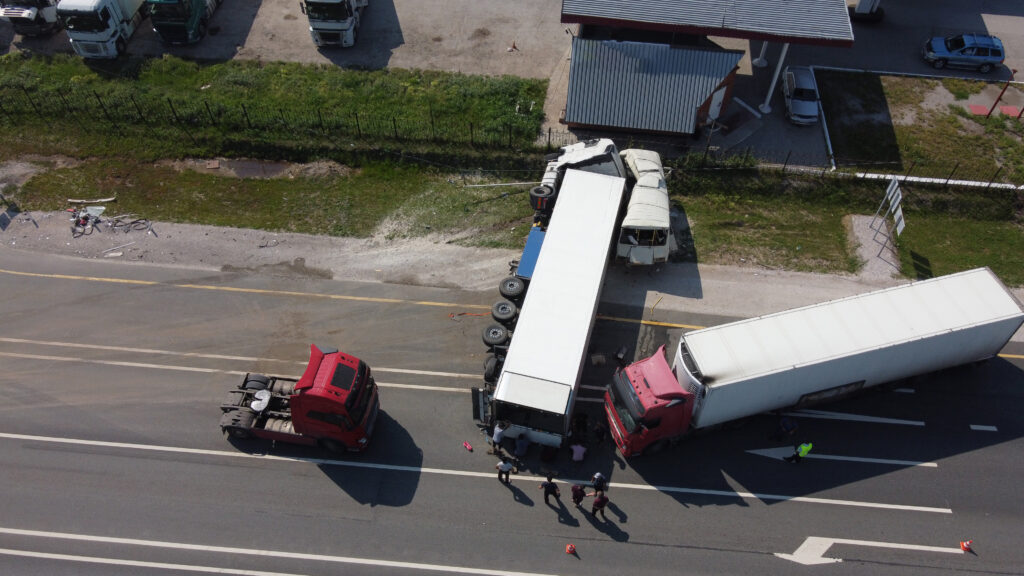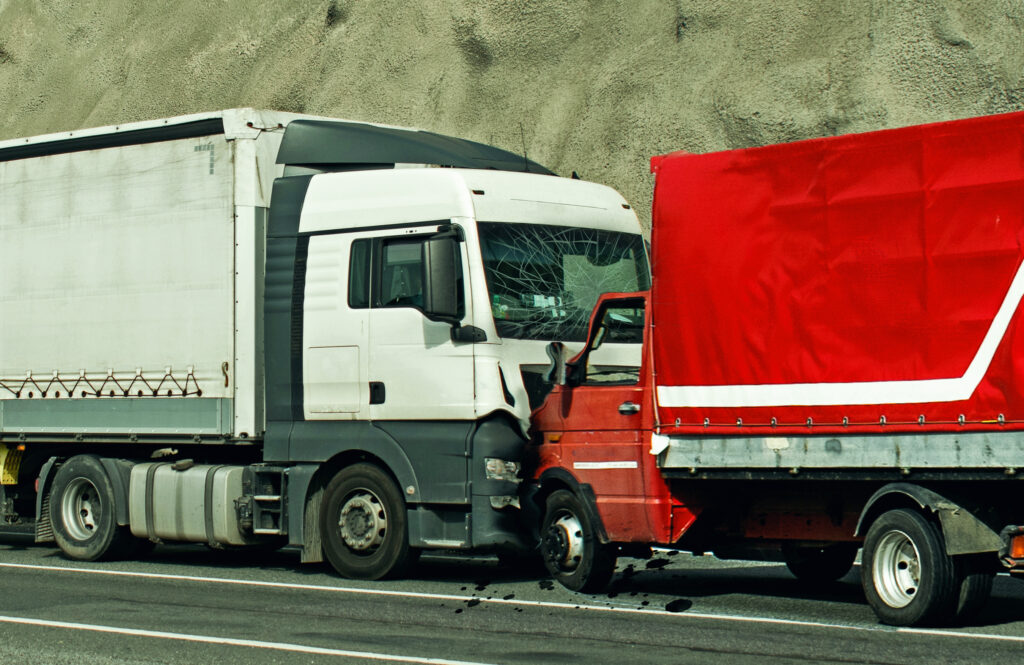Commercial trucking accidents involving big rigs, 18-wheelers, and tractor-trailers frequently occur when truck drivers, trucking companies, and others commit negligent acts. In some circumstances, these accidents arise when truck drivers and trucking companies violate Federal Motor Carrier Safety Administration (FMCSA) regulations.

When settling a truck accident claim, insurance companies may try to pin some or all of the blame on the innocent accident victim. For example, the insurance company may allege that the accident victim was speeding or committing another road-rule violation that caused or contributed to the accident.
An experienced truck accident attorney in San Antonio can fight these liability disputes and pursue the full monetary recovery you deserve. Specifically, your lawyer may file a lawsuit in the state court system on your behalf, represent you during all legal proceedings, and bring your case to an efficient resolution.
[toc_block title=”Table of Contents”]
Types of Truck Accidents
Truck accidents can manifest in various forms when truck drivers and trucking companies neglect safety measures or engage in reckless behavior.
Rear-end collisions occur when a truck follows too closely or fails to brake in time, leading to collisions with vehicles in front. These accidents often result in severe damage and injuries due to the substantial size and weight of commercial trucks.
Jackknife accidents involve the truck’s trailer swinging out to the side, forming an angle similar to a folding knife. This occurs when the truck’s cab and trailer become misaligned, often due to sudden braking or adverse road conditions.

Jackknife accidents can lead to multi-vehicle collisions and pose a serious threat to other road users.
Underride accidents transpire when a smaller vehicle becomes trapped underneath the rear or side of a truck during a collision. Inadequate underride guards on the truck or high-speed crashes may exacerbate the severity of these accidents, causing catastrophic injuries and fatalities.
Rollover accidents are another perilous type, where the truck overturns onto its side or roof. High speeds, sharp turns, or uneven road surfaces can contribute to rollovers. These accidents pose a significant risk to the driver, occupants of other vehicles, and even pedestrians in the vicinity.
Wide-turn accidents happen when a truck makes a turn, and the rear wheels follow a different path than the front wheels. This can result in collisions with vehicles in adjacent lanes or pedestrians in crosswalks. Failure to use proper signaling or insufficient turn clearance often contributes to these accidents.
Blind spot accidents occur when a truck driver fails to detect vehicles in their blind spots, typically on the sides and rear of the truck. Inadequate use of mirrors or failure to signal lane changes can lead to collisions, as the driver may not be aware of nearby vehicles.
Tire blowout accidents can transpire due to inadequate maintenance, overloading, or faulty tires. A sudden tire blowout may cause the driver to lose control of the truck, leading to accidents with other vehicles or objects on the road.
Truck accidents stemming from the negligence of truck drivers and trucking companies can manifest in various forms, including rear-end collisions, jackknife accidents, underride accidents, rollovers, wide-turn accidents, blind spot accidents, and tire blowout accidents.
Addressing the root causes of these accidents, such as inadequate maintenance and unsafe driving practices, is crucial to enhancing road safety and preventing catastrophic collisions.
Frequent Injuries in Truck Collisions
Victims of commercial truck accidents resulting from the negligence of trucking companies or drivers can endure a wide array of physical and mental impairments. Physical injuries often include traumatic brain injuries (TBIs), which result from the force of impact during the collision.
TBIs can lead to cognitive impairments, memory loss, and altered neurological functions, affecting the victim’s ability to perform daily activities and maintain a normal life.
Spinal cord injuries are another significant physical impairment. The force exerted in a truck accident can cause damage to the spinal cord, resulting in partial or complete paralysis. This life-altering consequence impacts mobility and necessitates long-term rehabilitation and care.
Orthopedic injuries, such as fractures and dislocations, are also prevalent in truck accidents. The sheer size and weight of commercial trucks amplify the force of impact, causing severe bone injuries that may require surgical interventions and extensive rehabilitation and can lead to long-term physical limitations.
Soft tissue injuries, including sprains and strains, are common and may cause persistent pain, swelling, and reduced range of motion.
Internal injuries resulting from blunt force trauma during a truck collision may involve:
- Damage to internal organs.
- Leading to internal bleeding or organ dysfunction.
- Requiring immediate medical attention and potentially life-long consequences.

Burn injuries can occur in truck accidents that involve hazardous cargo. Explosions or fires can cause severe burns, necessitating extensive medical treatment, surgeries, and long-term rehabilitation for victims.
Mental impairments resulting from commercial truck accidents can be equally debilitating. Post-traumatic stress disorder (PTSD) is a prevalent psychological consequence.
Witnessing or experiencing a severe accident can lead to persistent anxiety, flashbacks, and difficulty coping with daily life, requiring mental health support and treatment.
Depression and anxiety disorders often arise due to the significant life changes resulting from injuries sustained in a truck accident. The effect on the victim’s ability to work, engage in daily activities, and maintain relationships can contribute to mental health struggles.
Chronic pain syndrome is another pervasive mental and physical impairment. Severe injuries may lead to persistent pain, affecting the victim’s overall well-being and requiring ongoing medical management.
Victims of commercial truck accidents resulting from negligence may suffer physical impairments such as TBIs, spinal cord injuries, orthopedic injuries, soft tissue injuries, internal injuries, and burn injuries.
Additionally, mental impairments like PTSD, depression, anxiety disorders, and chronic pain syndrome can significantly affect the quality of life for those involved in these traumatic incidents.
Addressing both the physical and mental health aspects is crucial in providing comprehensive care and support for victims on their path to recovery.
What are the Legal Elements of Proof in a Truck Accident Claim or Lawsuit?
In a truck accident claim or lawsuit stemming from a trucking company or truck driver’s breach of the duty of care, there are several legal elements of proof for establishing liability.
The first element involves demonstrating that the at-fault party (or defendant) owed the accident victim (or plaintiff) a duty of care. Trucking companies and drivers are responsible for driving safely and adhering to established regulations, constituting a duty of care to other road users.
The second element requires establishing that the defendant breached this duty of care. This often involves presenting evidence of specific actions or inactions that deviate from the standard of care expected in the industry.
Examples may include driver fatigue, inadequate training, negligent hiring practices, failure to maintain vehicles, or violations of safety regulations.

Causation is the third critical element. The plaintiff must prove a direct link between the defendant’s breach of duty and the injuries they sustained in the truck accident. This involves establishing that the negligent actions were a substantial factor in causing the harm.
Evidence may include eyewitness testimony, professional opinions, and accident reconstruction analyses to strengthen the causal connection.
The fourth element pertains to the extent of damages that the victim suffered. Document medical expenses, lost income, property damage, and any other losses resulting from the accident. This element aims to quantify the plaintiff’s harm and determine the appropriate compensation to address these losses.
Witness testimonies are crucial in establishing these four legal elements, providing firsthand accounts of the accident, the circumstances leading up to it, and the aftermath. Expert witnesses, such as accident reconstruction specialists or industry professionals, can provide specialized insights to strengthen the plaintiff’s case.
Fighting a Liability Dispute after a Truck Accident
A truck accident attorney navigates a liability dispute with a negligent truck driver or trucking company’s insurer.
First, the attorney thoroughly investigates the accident, collecting pertinent evidence such as accident reports, witness statements, and any available surveillance footage. This meticulous examination helps to establish the facts surrounding the incident, laying the foundation for a strong liability case.
Experience in personal injury law empowers the attorney to assess liability and determine the most effective legal strategy. They identify the specific breaches of duty that the truck driver or trucking company committed, such as driver negligence, inadequate training, or failure to adhere to safety regulations.
This detailed understanding of the legal landscape enables the attorney to build a compelling case, highlighting the responsible party’s negligence.
When engaging with the negligent party’s insurer, the truck accident attorney is a skilled negotiator. Armed with a comprehensive understanding of the case’s merits, they present a compelling demand letter outlining the client’s injuries, damages, and the clear basis for liability.
This document serves as a starting point for settlement negotiations and emphasizes the strength of the accident victim’s claim.
Throughout the negotiation, the attorney remains assertive in advocating for the victim’s rights. They address any attempts by the insurer to undervalue the claim, presenting counterarguments and leveraging their legal knowledge to counteract attempts to minimize liability.
The attorney strategically navigates the negotiations, aiming to secure a fair and just settlement that adequately compensates the victim for the damages they suffered in the truck accident.
The attorney will escalate the matter to litigation if negotiations do not result in a satisfactory settlement. They guide the client through the legal proceedings, representing their interests in court. This readiness to pursue legal action demonstrates a commitment to securing fair compensation and holding the negligent party accountable.
The attorney may also enlist expert witnesses, such as accident reconstruction specialists or industry professionals, to strengthen the case further. Their testimony provides specialized insights, reinforcing the legal arguments and evidentiary support presented during negotiations.
A truck accident attorney is instrumental in resolving a liability dispute with a negligent truck driver or trucking company’s insurer.
Through thorough investigation, legal experience, and effective negotiation skills, the attorney strives to secure a fair settlement that justly compensates the victim for the damages they suffered in the truck accident. They are prepared to take the matter to court, ensuring that the accident victim’s rights and interests remain protected.
Available Monetary Damages Following a Truck Collision
Recovering monetary compensation for injuries sustained in a truck accident involves seeking compensation for specific damages.
One primary aspect is lost earnings, which entails compensation for income lost due to the inability to work during recovery. Victims are entitled to recover the actual income they might have earned if not for the injuries sustained in the accident.
Lost earning capacity is another crucial element in seeking compensation. This pertains to the long-term effect on the victim’s ability to earn income in the future. The injuries sustained may limit career prospects, necessitate a shift to less remunerative employment, or even lead to permanent disability that warrants compensation for the diminished earning capacity over the victim’s lifetime.
Medical expenses also constitute a significant part of the compensation sought. This includes reimbursement for hospitalization, surgeries, medication, rehabilitation, and any other necessary medical treatments resulting from the truck accident. The goal is to ensure adequate compensation for the victim, covering all past and future medical costs associated with their injuries.

Seeking compensation for emotional distress involves addressing the psychological impact of the truck accident. The trauma experienced may lead to persistent anxiety, depression, or other emotional challenges, warranting compensation for the mental distress that the victim endured.
Pain and suffering damages address the physical and emotional distress the accident victim experienced due to their injuries. This compensation acknowledges the pain endured during and after the accident, as well as the ongoing suffering resulting from the injuries.
Inconvenience compensation recognizes the disruptions to the victim’s life from their injuries. This may include the inconvenience of attending medical appointments, enduring pain, and the overall disturbance to their daily routine.
Lost quality of life represents a broader category of damages, encompassing the adverse effect on the victim’s overall well-being. Compensation is available for the diminished ability to enjoy life’s pleasures, engage in activities they once found fulfilling, and experience a satisfactory quality of life.
Recovering monetary compensation after suffering injuries in a truck accident involves seeking compensation for lost earnings, lost earning capacity, medical expenses, emotional distress, pain and suffering, inconvenience, and lost quality of life.
Each element addresses specific aspects of the victim’s losses, aiming to provide comprehensive compensation that reflects the full extent of their damages.
Speak with a Truck Accident Attorney in Your Area Right Away

If you suffered injuries in a collision that a truck driver or trucking company brought about due to negligence, you must take action immediately.
Truck accident victims must normally file a personal injury lawsuit within two years of their accident date. If they fail to do so, absent a few extremely limited circumstances, they will no longer be eligible to pursue or recover monetary damages for their losses.
A truck accident lawyer can swiftly file a personal injury claim or lawsuit on your behalf, safeguarding your right to recover the financial compensation you deserve for your injuries.
